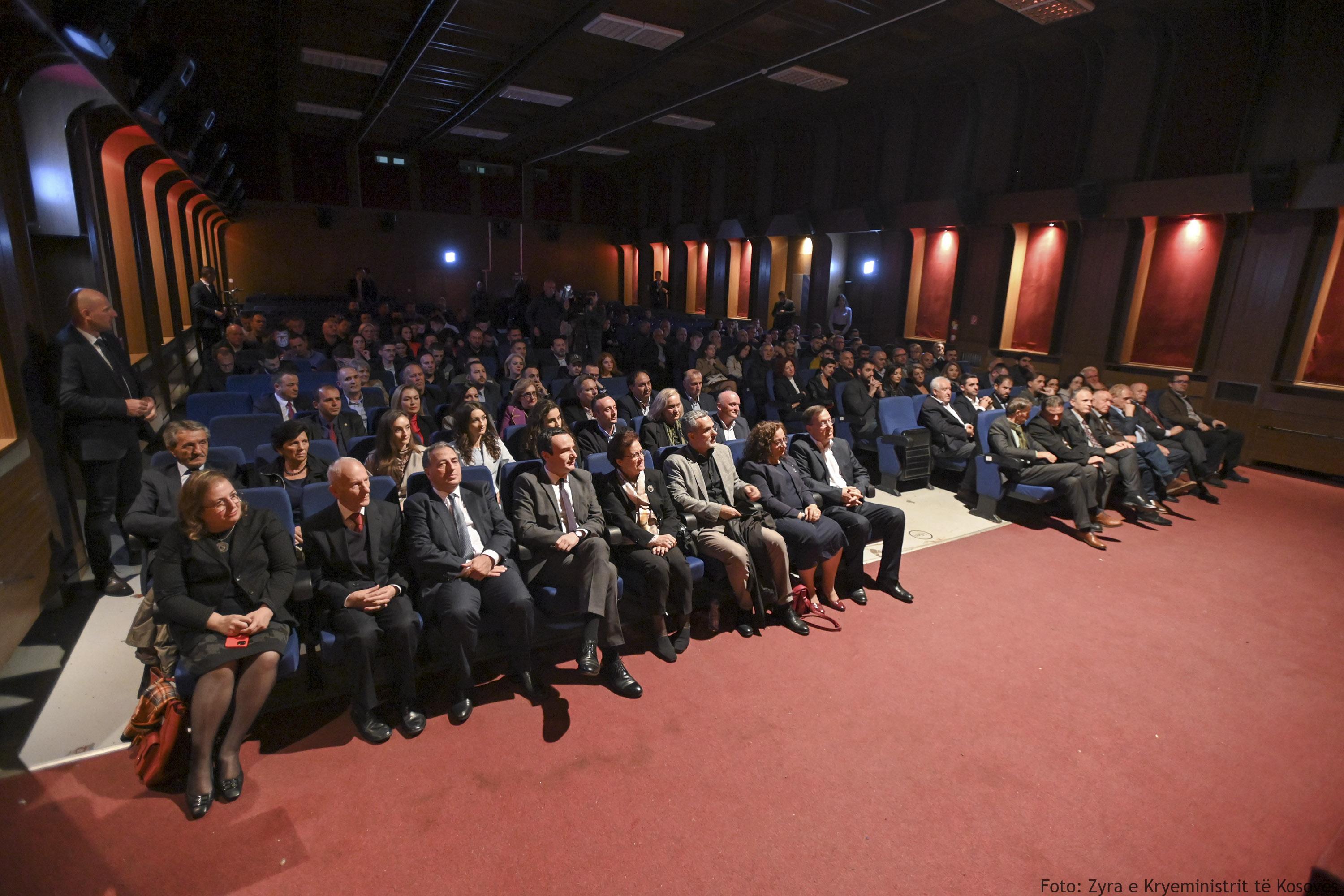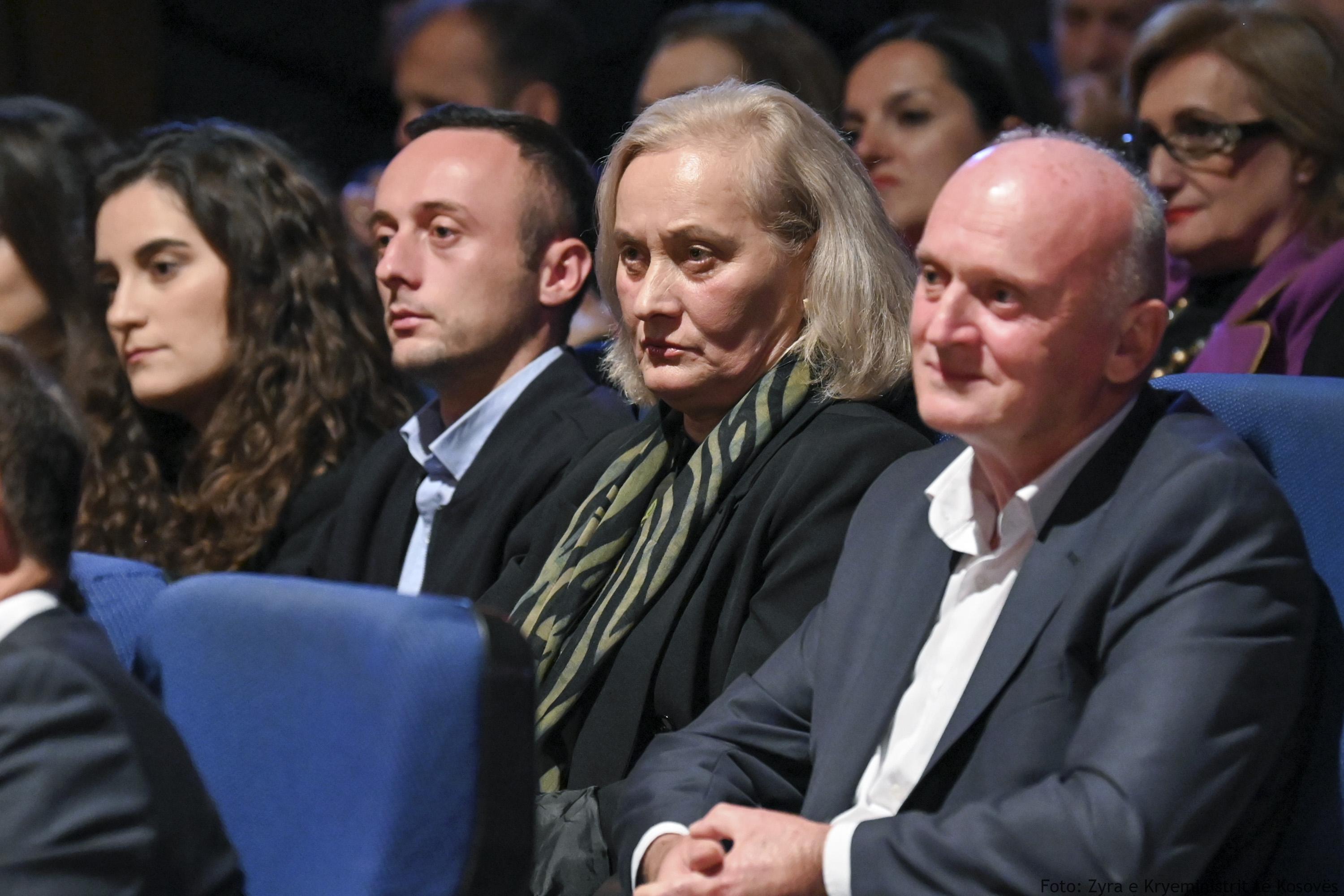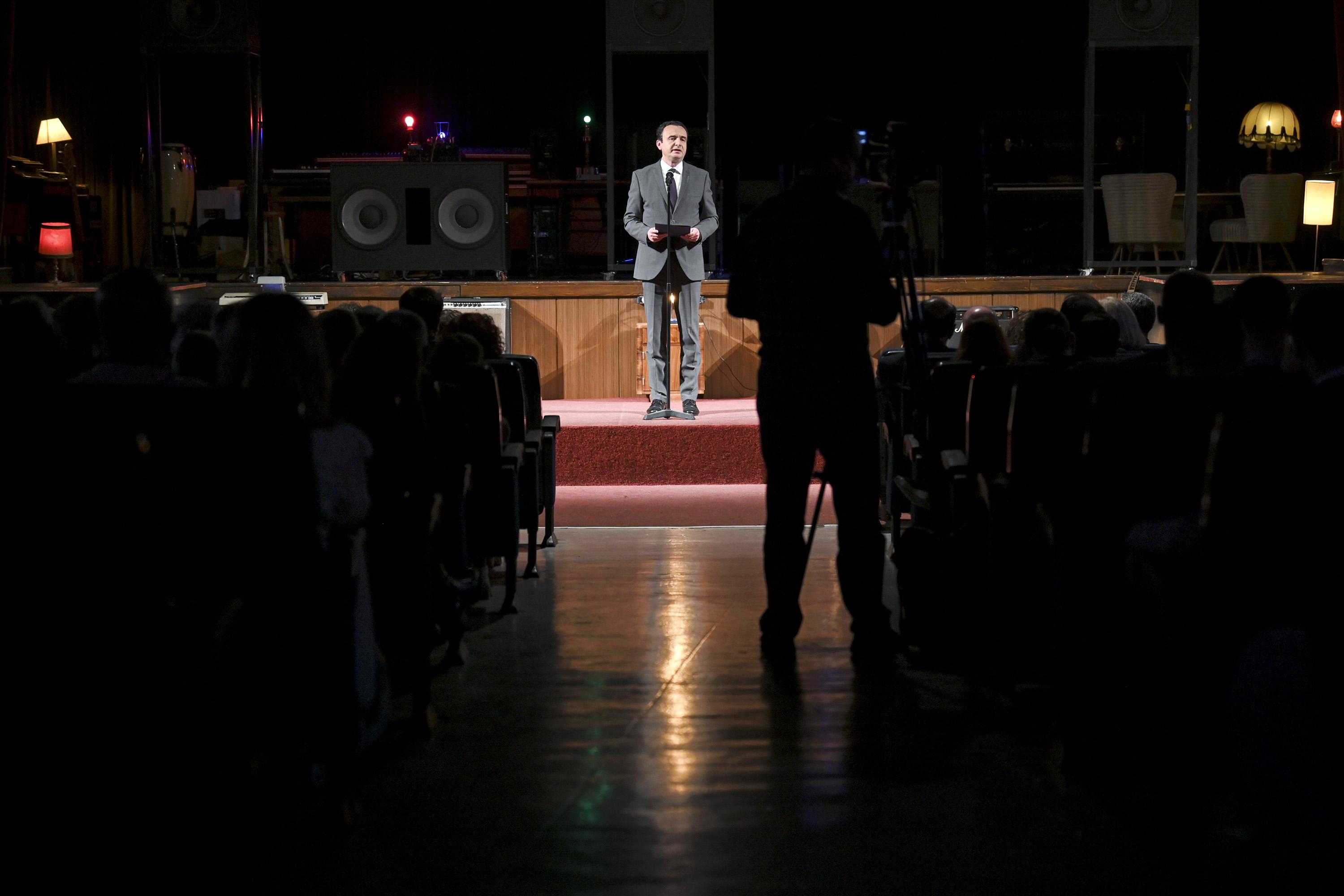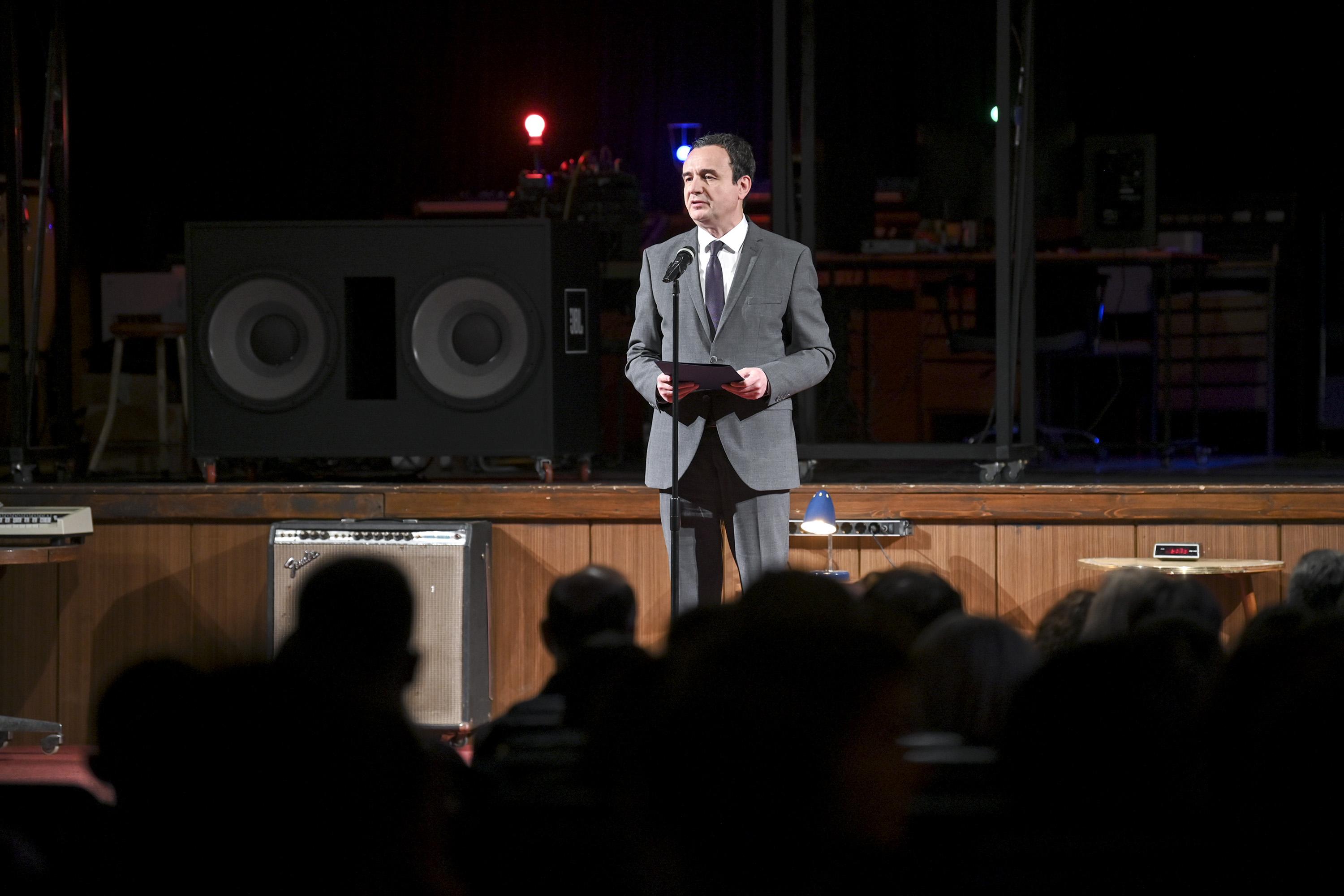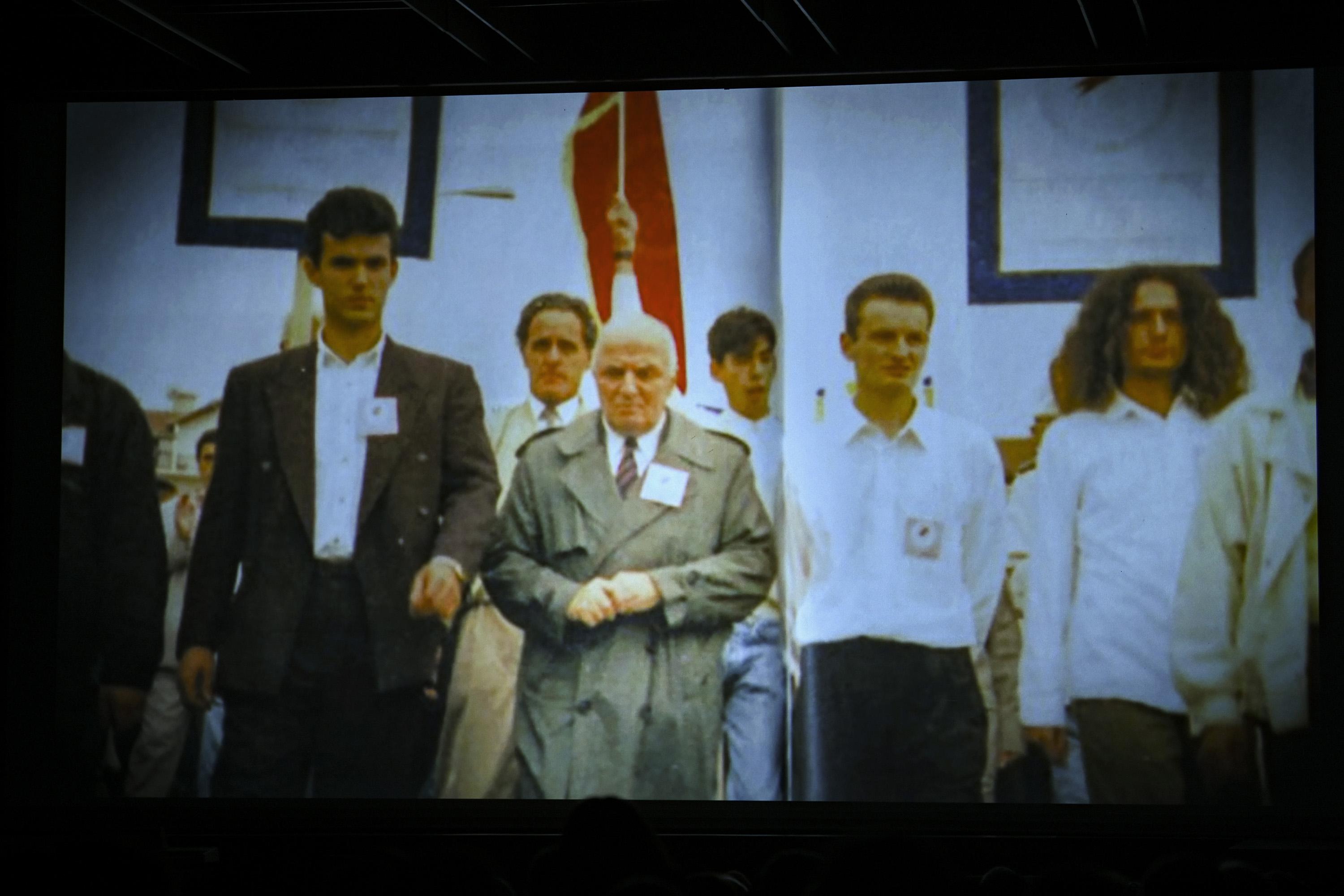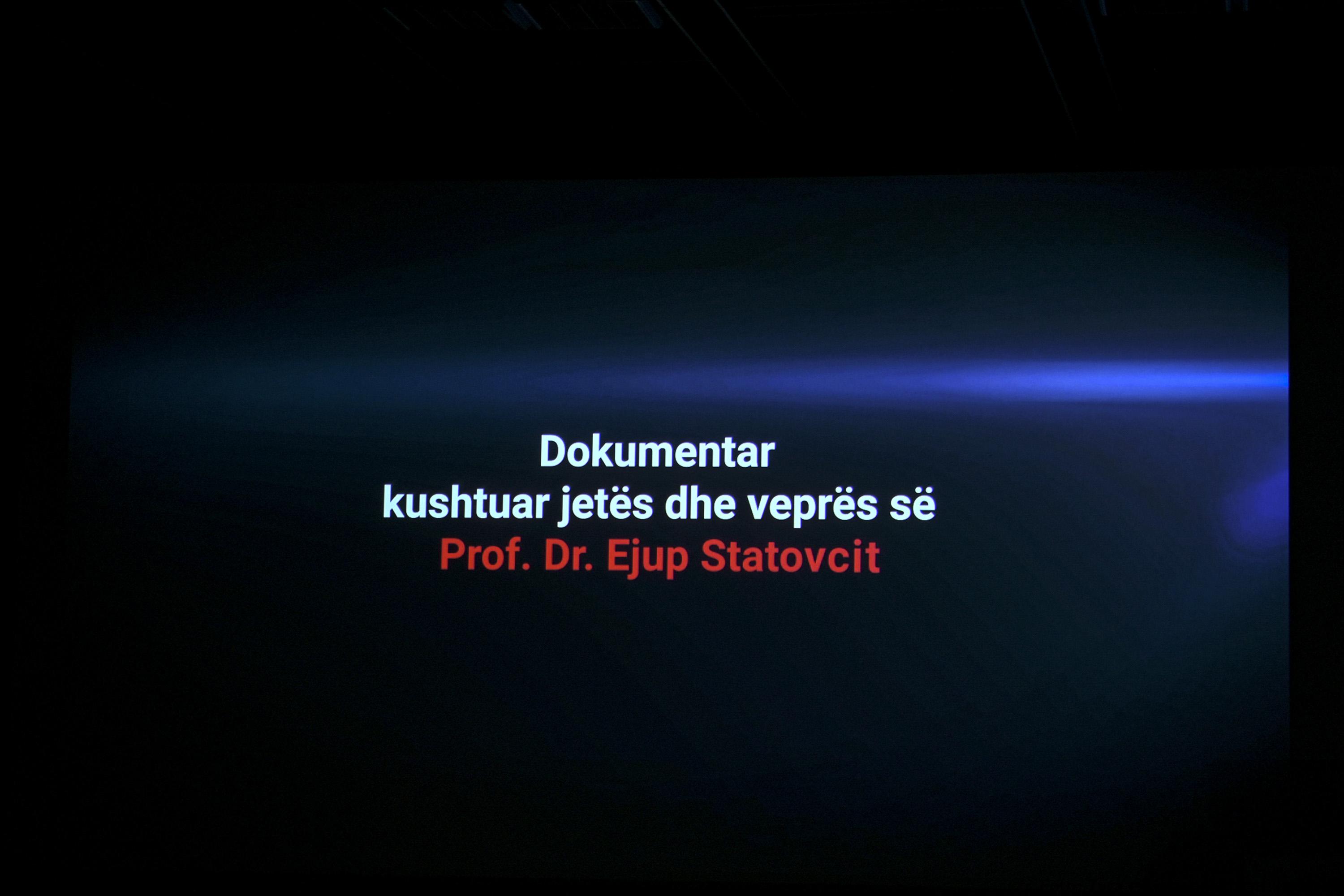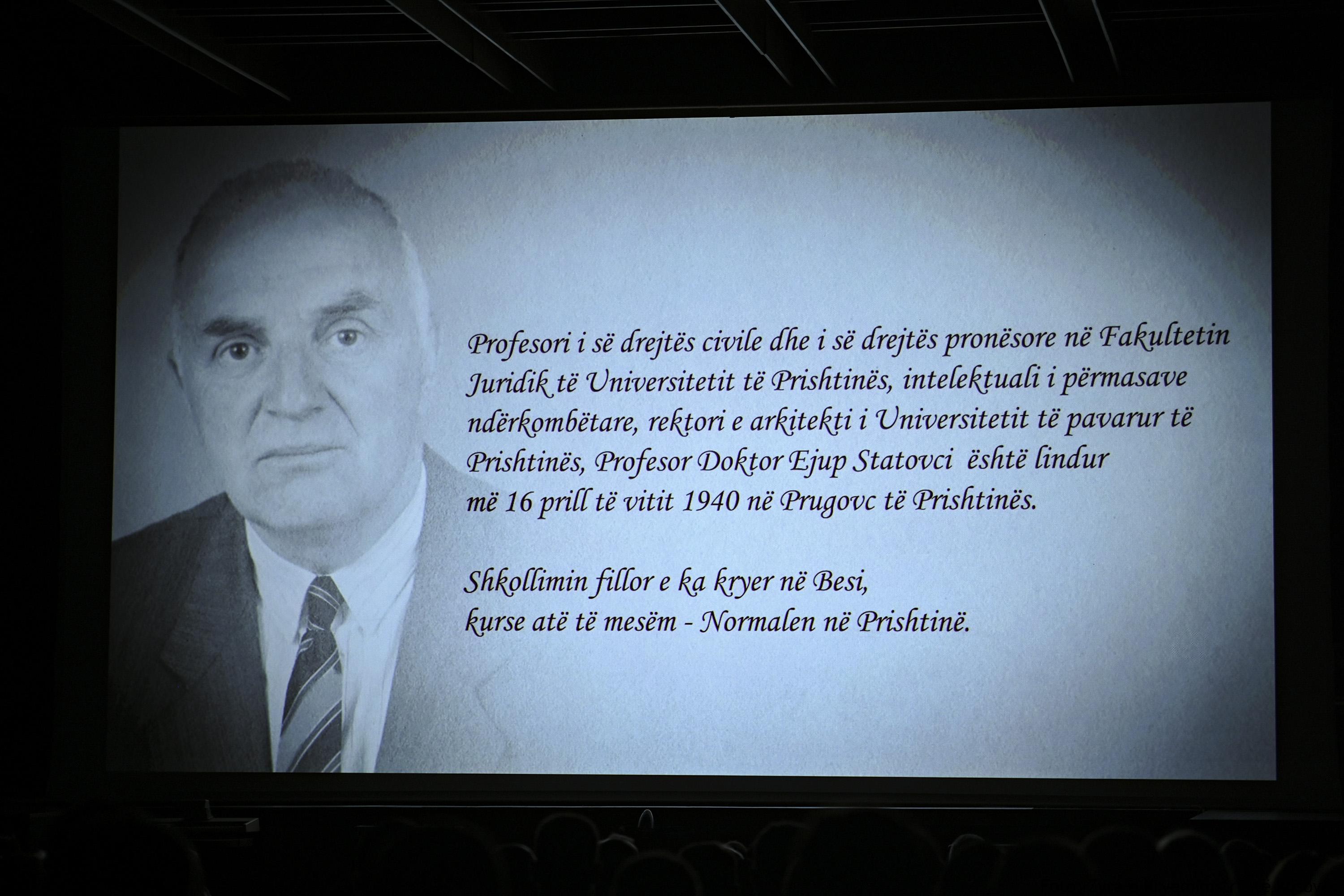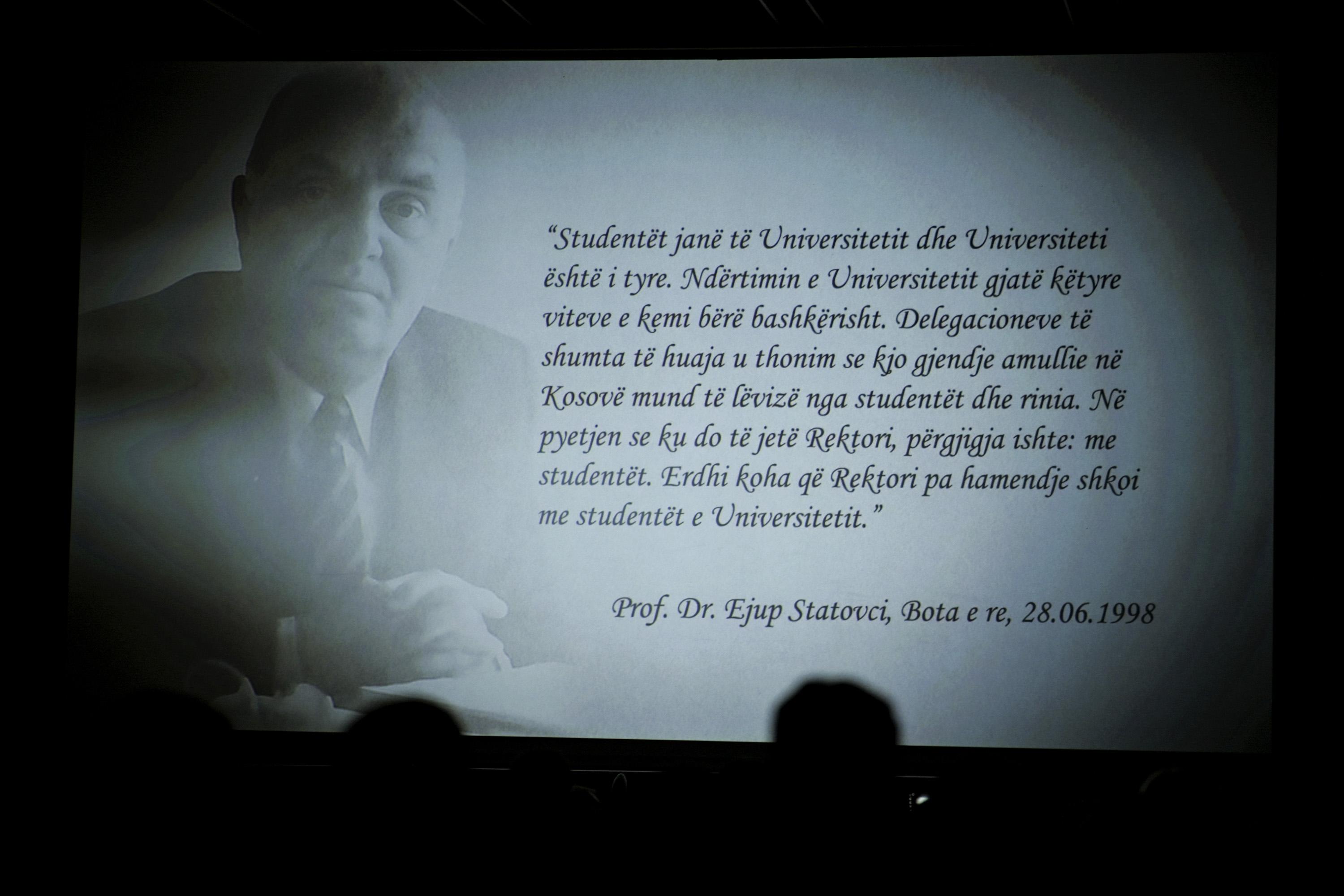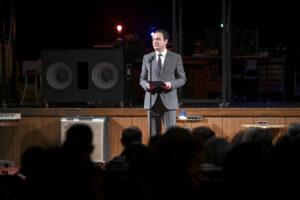Prishtina, 30 September 2022
The scientific and public work of the professor and rector of the University of Prishtina, Ejup Statovci, was shown tonight in the documentary dedicated to his life and work.
In his speech to the attendees, the Prime Minister of the Republic of Kosovo, Albin Kurti, appreciated the contribution of rector Statovci, as one of the experts who drafted the Constitutional Declaration of 2 July 1990 and the Constitution of the Republic of Kosovo on 7 September in Kaçanik. “Among the experts and lawyers who drafted these two fundamental documents in the institutional history of Kosovo, there was also a professor of civil law, who was back then 50 years old. His name was Ejup Statovci”, said so the Prime Minister.
“Until the age of 51, Ejup Statovci’s life was that of a dedicated professor and a productive scientist. It could have continued with this flow if back in 1991, when Serbia expelled the Albanians from the University of Prishtina, he wouldn’t accept the promotion as the Head of the University of Prishtina i.e., Rector. In the history of our university, he is the 10th rector in a row, however, Ejup Statovci is the longest-serving rector, who led the University of Prishtina, i.e., as of 26 November 1991 to 31 December 1997”, stated further Prime Minister Kurti.
Professor Ejup Statovci stayed loyal to his cultural shaping, converting his thoughts and convictions from knowledge and faith to courage to speak and will to act. He correctly and fairly understood the duties assigned to him by the position of the rector of the University of Prishtina and the role that time demanded of him in society, said Prime Minister Kurti. He added that Professor Ejup Statovci became part of history in a very authentic manner. That long list of scientific publications of Professor Ejup Statovci during the ‘70s and ‘80s was significantly shortened in the ‘90s, because in the last decade of his life, Professor Ejup Statovci became an academic of resistance.
May our memory of Professor Ejup Statovci be eternal and may his role in the history of Kosovo be legible, Prime Minister Kurti said so in closing his speech.
Full speech of Prime Minister Kurti:
Dear Professor Drita Halimi Statovci,
Honoured Rector of the University of Prishtina,
Beloved Driart, Jeton, Mentor,
Dear professors Ahmet Geca, Musli Bajraktari, Ismet Salihu,
Honoured President of the Student Parliament, Çlirim Hoti,
Honoured Vice President of the Student Parliament, Alba Lala,
Dear professors and students,
Ladies and Gentlemen, sisters and brothers,
The last decade of the XX century ended over two decades ago, however, it is the most inevitable decade to understand the history of Kosovo even today. If starting from the ’90s, you can easily go backward or forward in history, because the ’90s are the result of all those years that Kosovo spent in the three Yugoslavia periods, as well as years of secession and big break points, where the new and free Kosovo was born therefrom.
From 1989 to 1991, in succession, Serbia suppressed the autonomy of Kosovo, dismissed thousands and thousands of Albanians from work, hospitals, schools, closed the only radio-television and newspaper that Kosovo had in the Albanian language, and, in particular, expelled Albanians from the University of Prishtina, installing a policy of apartheid and segregation.
In the stream of this efforts, the delegates of the Assembly of Kosovo approved the Constitutional Declaration of 2 July 1990 and the Constitution of the Republic of Kosovo on 7 September in Kaçanik. Among the experts and lawyers who drafted these two fundamental documents in the institutional history of Kosovo, there was also a professor of civil law, who was back then 50 years old. His name was Ejup Statovci. Tonight, the story of the said Professor is also the reason for our meeting, on the eve of the 25th anniversary of the protest of 1 October 1997.
Born on 16 April 1940 in the village of Prugoc in Prishtina, he was the sixth child after three sisters and two brothers. Although musically inclined, Ejup Statovci studied law at the University of Zagreb, where he graduated in 1966 and obtained a Master’s degree in 1971, to continue further his doctoral studies at the University of Ljubljana, where he defended his thesis in 1974, with a thesis on legal property relations in real estate in Kosovo. Since 1968, he started working as an assistant professor at the Faculty of Law and Economics, where after the establishment of the University of Pristina in 1970, he climbed all the academic ranks up to the rank of full professor in 1980. In the academic year 1979/80, Ejup Statovci won a Fulbright scholarship through which he went as a visiting scholar to Harvard University in the United States of America. During the three decades of his academic career, Professor Ejup Statovci published a number of scientific works and monographs, such as “Protection of ownership”, “Property: origin and development”, “The right of servitudes”, “The right of pledge” and others.
We will certainly have the opportunity to learn more about the life and scientific and public work of Professor Ejup Statovci from the documentary that will be shown tonight, anyhow, I mentioned these bibliographic data from the profile of Professor Ejup Statovci to get to the point of my speech regarding him tonight: as an engaged intellectual and academic of resistance.
Until the age of 51, Ejup Statovci’s life was that of a dedicated professor and a productive scientist. It could have continued with this flow if back in 1991, when Serbia expelled the Albanians from the University of Prishtina, he wouldn’t accept the promotion as the Head of the University of Prishtina i.e., Rector. In the history of our university, he is the 10th rector in a row, however, Ejup Statovci is the longest-serving rector, who led the University of Prishtina, i.e., as of 26 November 1991 to 31 December 1997.
This is the most difficult period in the entire history of the University of Prishtina, i.e., when the University of Pristina was practically re-established, emerging in what has been called back then the parallel system of education, developed in homes and private premises. It is the period when the University of Prishtina with 14 faculties, 7 higher schools, 845 pedagogues, 247 collaborators and about 20 thousand students, functioned thanks to the infinite will of the people who engaged and financed the University of Prishtina as a parallel universe, challenging the regime occupier of Serbia in Kosovo. It was the time when after the failure of every political effort to return to the university premises, the students of the University of Prishtina, organized within the Independent Union of Students of the University of Prishtina and supported by thousands and thousands of citizens, organized the already well-known protest of 1 October 1997, which started a new period of student movements in Kosovo, as they had been in 1968, 1981. It is the time when few believed that we students could change the direction of political developments in Kosovo, and when many were reluctant to join our effort to return to the premises of the UP’s university campus and expose the violence that Serbia was doing to the autochthonous Albanians. And it is the time when we, the students of the University of Prishtina, despite the obstacles, difficulties and dangers, on 1 October 1997, lined up on both sides of the rector Ejup Statovci to march peacefully on the streets of Prishtina, in that protest which broke the image inviolable of the myth of the Serbian policeman and which would also become the prelude to the liberation war in Kosovo.
My friends and I have spoken many times about the student movement of the Independent Union of Students of the University of Prishtina, as we have spoken again about this documentary dedicated to the Rector of the University of Pristina, Ejup Statovci.
We are together again tonight in this cinema hall, while Professor Ejup Statovci has become a closed chapter in the modern history of Kosovo. A chapter among the clearest and most authentic of all.
Because, if you want to understand the history of Kosovo, you can look at it as a miniature in the very history of the University of Prishtina. Founded after the protests of 1968, the University of Prishtina would become the most powerful weapon of the Kosovar Albanians against the former Yugoslavia. And exactly when the Serbian government in Belgrade wanted to take this weapon from the hands of the Kosovar Albanians, they shot it on target. If Croatia and Bosnia had their armies to separate them from the Army of Yugoslavia and fight Serbia, Kosovo had the University of Prishtina as an army with its students, many of whom would also join the Kosovo Liberation Army.
However, the students were not alone, they had the support of the overwhelming majority of the academic staff of the faculties of the University of Prishtina, and especially their managements. By expelling them from the University of Prishtina in 1991, Serbia intended to turn Kosovar Albanians back into a society without a university. Taking away the university, Serbia wanted to take away the universal along with politics, stripping us of the public sphere.
In a lecture held in 2011 at the National Library of Kosovo, entitled “The idea of the university: program for an archaeology”, the researcher and translator of philosophy, who comes from Vlora and lives in Paris, Orgest Azizi, said: “Never we have had so much, so intensively University, than during the Serbian rule, the time when it was forbidden. At the time when the university was forbidden, i.e., when the occupier declared that there is no university, at the time when Belgrade declared that the degrees of the University of Prishtina were not degrees and the people who populated it were not professors and students. The university was a genuine political place and the student an absolute political figure.”
The University of Prishtina may seem average in terms of scientific production, due to the stages it has been forced to pass through, notwithstanding, the University of Pristina has maximally developed a powerful component of the university, namely the role of the university over the public sphere, as a sphere where policy is made. The University of Prishtina has produced entire generations of cultural and political elites, bearers of emancipatory social processes over many decades, just as the University of Prishtina has also produced the mental universe of the Republic of Kosovo itself.
Professor Ejup Statovci stayed loyal to his cultural shaping, converting his thoughts and convictions from knowledge and faith to courage to speak and will to act. He correctly and fairly understood the duties assigned to him by the position of the rector of the University of Prishtina and the role that time demanded of him in society. Therefore, Professor Ejup Statovci became part of history in a very authentic manner. That long list of scientific publications of Professor Ejup Statovci during the ‘70s and ‘80s was significantly shortened in the ‘90s, because in the last decade of his life, Professor Ejup Statovci became an academic of resistance. Professor Ejup Statovci would be 82 years old today, if he had not left us so early, on 19 October 1999, at the age of 59.
Hence, may our memory of Professor Ejup Statovci be kind and eternal and may his role in the history of Kosovo be legible.
Thank you!


